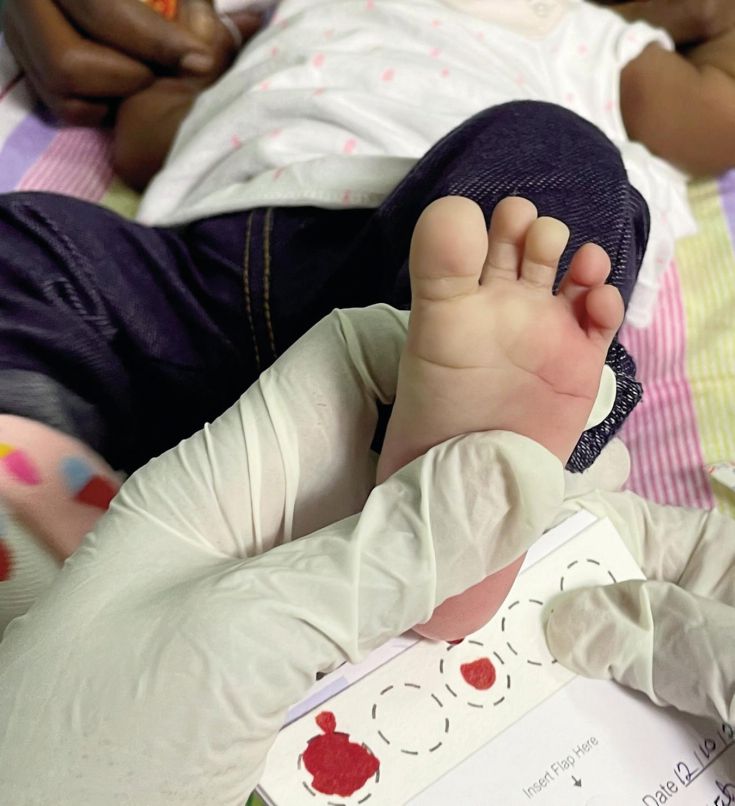WHY DOES NBS MATTER?
According to the CDC, each year, more than 13,000 newborn babies are identified with abovementioned conditions, and more. NBS has been proved to be a relatively easy and cost-effective way of improving the overall health of a population. A simple heel prick of a newborn, in the first week of life, is all that is needed to screen for up to 50 inherited conditions.
Many disorders screened today show no signs in the first few weeks of life, which means a seemingly healthy baby could have a condition that may affect mental and physical development or cause early death. Through screening, potentially life threatening conditions in the first stages of life are identified for timely treatment and therapies to be introduced. The treatment for conditions can also be straightforward and inexpensive, such as dietary changes or the introduction of a supplement. Some therapies also require knowledge of an individual's precise genetic code, which makes genetic testing crucial, not only for diagnosis, but also future treatments.
WHAT ARE THE CURRENT PROGRAMS THAT HELP PROMOTE NBS NATIONALLY AND INTERNATIONALLY?
NBS programs are required by law in all 50 U.S. states, the District of Columbia and Puerto Rico. The Recommended Universal Screening Panel (RUSP)6 – a list of primary and secondary disorders that all newborns should be screened for, was established in 2002 by the Department of Health and Human Services (HHS) to guide each of these individually led programs.
Today, the RUSP includes CH, PKU, SMA, severe combined immunodeficiency (SCID), and cystic fibrosis, to name a few. As science evolves and innovation in the detection and treatment of congenital diseases continues, groups of researchers, physicians and patient advocacy organizations petition to add new disorders to the RUSP.

SCREEN TIME: When a baby is born, a healthcare professional will administer a simple heel prick to collect a blood spot sample.
In 2022, Parent Project Muscular Dystrophy submitted its newest nomination package7 to add DMD to the list. A core component of this submission was the completion of a large pilot study in October 2021 to help demonstrate the effi
cacy of testing newborns for DMD. Exciting news has also come out in October 2023, when Governor Hochul of New York State8 signed bill S6814/A5042, making Duchenne NBS mandatory for all babies born in the state.
There have also been efforts making NBS more accessible for populations around the world. For example, the Noguchi Memorial Institute for Medical Research (NMIMR)9 has trained seven countries in sub-Saharan Africa, including: Ghana, Nigeria, Liberia, Uganda, Tanzania, Kenya and Zambia, to efficiently screen newborns for sickle cell disease (SCD).
NBS is pivotal for identifying conditions in all babies, regardless how healthy they seem. With the collaboration between test providers, labs and governments, more
and more newborns around the world are getting the medical treatments they need, in a timely fashion. As the understanding of the potential life-altering impacts of NBS rises, we hope to advance the technology thorough various tools we currently have, and make it more convenient and affordable for all populations, to truly democratize NBS for millions of families.•
- 6. hrsa.gov/advisory-committees/heritable-disorders/rusp
- 7. www.parentprojectmd.org/ppmd-submits-rusp-nominationpackage-for-duchenne-muscular-dystrophy/
- 8. www.parentprojectmd.org/duchenne-added-to-new-york-statesnewborn-screening-panel/
- 9. https://gna.org.gh/2023/09/noguchi-revvity-train-seven-consacountries-to-enhance-newborn-sickle-cell-screening/
ABOUT THE AUTHOR:

Petra Furu is the general manager of reproductive health at Revvity. She is solution driven and forward looking, leading by example. She is passionate about driving the right decisions to help provide solutions enabling a healthy start in life. Petra has a PhD in biochemistry and eMBA in strategic business and organizational management. She has worked in science, product management and strategic business planning, as well as research and development. Petra has strong knowledge about both IVD and medical device industry regulations.